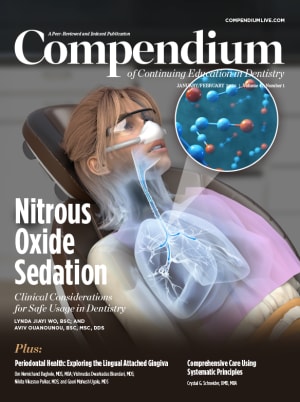Addressing the Oral Health Needs of Veterans
Veterans, especially those who have experienced military combat, face unique challenges, including the impact of post-traumatic stress disorder (PTSD), in their ability to access and receive dental ca...
The oral health needs of US veterans are an often overlooked aspect of their overall well-being. Veterans, especially those who have experienced military combat, face unique challenges, including the impact of post-traumatic stress disorder (PTSD), in their ability to access and receive dental care. Organizations like the Pacific Dental Services (PDS) Foundation, Veterans Legal Institute (VLI), and PDS Health are working to shed light on these challenges and discuss initiatives designed to improve oral healthcare for veterans.
The disparities are clear: 42% of veterans reported having had gum treatment or bone loss around their teeth, which is a significantly higher proportion than reported by nonveterans (27%). Also, roughly two in five veterans described their oral health as fair or poor. This extrapolates to 8 million veterans with deficient oral health.1
Veterans suffering from PTSD encounter significant barriers when accessing dental care. PTSD can heighten sensory sensitivities and trigger severe anxiety in clinical settings, making dental visits particularly daunting.
Challenges of VA Dental Care
Veterans seeking dental care through the US Department of Veterans Affairs (VA) face stringent eligibility requirements and numerous challenges. Unlike other VA health services, dental care is not universally provided to all veterans. Eligibility is often limited to those with service-connected dental conditions, former prisoners of war, or those enrolled in vocational rehabilitation programs, among other specific criteria.
This leaves a significant portion of the veteran population without access to necessary dental care. The application process for VA dental benefits can be complex, adding another layer of difficulty for veterans already dealing with physical and mental health issues. Even when veterans qualify for care, they may face long wait times and limited availability of services.
The VLI assists veterans in navigating these bureaucratic hurdles. It provides free legal services to Southern California low-income veterans struggling with housing, healthcare, employment, and education barriers. As part of its healthcare advocacy, VLI is a strong voice for policy changes to expand eligibility and streamline the application process, ensuring that more veterans receive the dental care they deserve.
"Dental health issues prominent in veterans, and specifically those who experienced combat, may further aggravate symptoms of PTSD and degrade overall health," says Antoinette Naddour, Executive Director and Cofounder of VLI. "We must provide our service members with top-quality healthcare, including dental, and ensure their overall well-being. This is a small repayment of the large debt owed to them by society for the safety and freedom of the American people."
Clinical and Accessibility Issues
Veterans face significant oral health disparities compared to the general population. Factors such as PTSD, limited access to care, and the physical and mental toll of military service contribute to poor oral health outcomes. Many veterans suffer from conditions like untreated dental decay, periodontal disease, and tooth loss. Clinical studies have shown that veterans are more likely to have unmet dental needs, which can lead to severe health complications.2,3 Poor oral health is linked to chronic diseases such as diabetes and cardiovascular conditions, further exacerbating the health challenges veterans face.
Lieutenant Colonel and General Dentist Dr. Kelley Ryals notes, "Being a dentist in a civilian practice as well as in the Army has given me a unique perspective. In civilian practice, we treat the whole patient for the best medical/dental long-term health. We assess the patient's health and explain that the mouth and body are connected and try to treat as a whole patient. In a military practice, we treat the soldier only for the immediate future, the minimum treatment the soldier will need to get him/her on their next mission. Most veterans do not have access to dental care, nor have they been set up long-term for good dental/medical health. We must start taking care of the veteran's whole health journey."
Specialized Dental Care Settings
The PDS Foundation's Dentists for Special Needs office in Phoenix, Arizona, has observed firsthand the struggles veterans with PTSD face. Their approach includes creating a calm and supportive environment, utilizing desensitization techniques, and employing a team trained to recognize and manage PTSD symptoms. For example, sensory-friendly waiting areas, longer appointment times to avoid rushing, and specialized environments to help veterans acclimate to their dental appointments have been implemented. Efforts such as these are crucial in reducing the anxiety and fear that many veterans experience when seeking dental care.
The American Dental Association Foundation's Give Veterans a Smile program is designed to address the immediate dental needs of veterans. This program encourages dentists to provide pro bono oral healthcare to underserved veterans and assist them in finding a dental home. By bringing together dental professionals, advocates, and community leaders, the program aims to create a sustainable model for improving access to dental care for veterans nationwide.
A key inaugural event in the Give Veterans a Smile initiative was a pilot program held this past November in New Mexico that provided $73,451 in donated dental care to 21 local veterans. PDS Health-supported dentists and the PDS Foundation are committed to supporting this initiative and hope to see it expand to other parts of the country.
Conclusion
The disparities in the oral health of veterans have been ignored for way too long. Addressing the unique challenges faced by veterans with PTSD, advocating for expanded access to VA dental services, and tackling oral health disparities are crucial steps in fulfilling this duty. By working together, the industry can collectively ensure that all veterans have access to the dental care they deserve.
About the Authors
Michael M. Le, MBA, JD
Executive Director, Pacific Dental Services Foundation, Irvine, California
Antionette Naddour, Esq., LLM
Executive Director and Cofounder, Veterans Legal Institute, Tustin, California
Kelley Hollingsworth Ryals, DDS
Owner Dentist, Private Practice, Santa Fe, New Mexico
